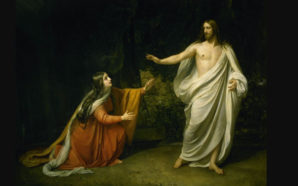Some time ago a colleague of mine, finding out I go to daily Mass, asked me why I believe, explaining to me why he finds it hard to. We must have spent hours over several years addressing issues he has with faith. I have introduced him to several priests, taken him to Mass on occasion, and introduced him to books and seminars on faith, and we have become close friends. And yet, he remains tossed around in the ambivalent oceans of agnosticism. So too are some of my family members and friends, who have gradually slipped away from the faith, citing scandal, irrelevance or disinterest as reasons.
With increasing secularisation and a clamping down of religious expression and discussion, what happens to those who have rejected Christ and his Church, or miss out on hearing about it? Christians believe Jesus is ‘the Way, the Truth and the Life’, and yet the numbers who believe this are falling.
At last check on trusty Google, only a third of the world claim to be Christian, and less than a fifth, Catholic. For many of us who have family and friends estranged from the Church, this can be a cause of great distress. A cloud seems to hang over those who have grandchildren unbaptised, or children too busy to give time to God or who adopt with open arms the secular attitudes and ways of the world. We are reminded at Mass of the Lord’s promise: ‘Peace I leave you, my peace I give you’, and yet inner peace seems far off for those worried for the spiritual wellbeing of their dear ones. Has God got it wrong? Could it be that at least two-thirds of his creation are destined to not spend eternity with him, the God who loves each of his creatures as though none other existed? The same God who left the 99 sheep for the one?
Perhaps a means of receiving God’s promised peace in our hearts is to remind ourselves that God is handling this—in the words of my Dad’s favourite saying, we can ‘let go and let God’. At times we may be too focussed on having our dear ones utter explicit acknowledgement of God through formal faith, and fret when this does not happen. Yet, if we focus on God’s searing knowledge of each of us, inside and out, and remember that his concern for our dear ones far exceeds ours, notes of discord and angst are gradually replaced with trust, patience and peace. And we remember that a relationship with God is a heart-to-heart connection, not a head-to-heart. We show belief through our hearts and our actions, not through our heads and our words.
It is, after all, the condition of the heart that matters—not so much what we claim but who we are as people. Only God knows us fully, knows our hearts fully, knows the exact number of hairs on our heads. So it is only God who knows that some are aligned with him yet disappointed from past experiences of Church and unwilling to recommit; or that some are aligned with him, yet too timid to break the moulds of secular family ties to publicly declare faith; or that some are aligned with him, yet too anxious, too insecure, to jump off the rat race to find true peace. It is God who truly understands these trials, and sees the good heart within the constrained body; who takes no offence when he beckons with love, only to be rebuffed by a soul too consumed by the desperate need to ‘succeed’ in the eyes of the world, deafened by the world’s noise, oppressed by the world’s expectations.
Where some might see a ‘heathen’, an ‘atheist’, a ‘non church-goer’, God sees the heart that melts compassionately at the dishevelled drunk, that cooks a meal for the lonely widow, that expands in gratitude for a beautiful sunset, grateful to a yet-unacknowledged Creator. God knows that our beliefs run deeper than those we are able to express.
This allows me to see beyond opportunities for proselytising, or fretting over those with waning faith. It reminds me to look instead at the person as God sees them—their goodness, their beauty, their potential for growth as well as their potential to teach me a thing or two. There are many non-Catholics from whom I learn the art of living my faith simply: a Buddhist with whom I have shared many a long and delightful conversation about surrendering to the beauty of life; the colleague I mentioned, who shows true humility in his search for God; another agnostic who challenges me to live in harmony with all creatures and the environment around me; another, who is apparently too ‘intellectual’ to have time for God, yet loves his kids with a love akin to God’s; and yet another sensitive soul who, torn asunder by past experiences, denies God, but who repeatedly reveals glimpses of Jesus. When I am with one of these, our hearts find common ground where our sets of beliefs cannot. Our hearts gradually begin to beat in sync, seeking out the rhythms of God in the depths of the other’s heart—harmonious, melodious, beating loud and joyfully at times, or gently, as background to our daily tasks.
We know Jesus was critical of the pharisaical approach to faith, that of tying heavy and unfair burdens on believers, of self-righteous judgment of others, of overt yet insincere demonstrations of faith, of missing the point of faith and being the clanging cymbal. We might assist more in drawing believers to God when we look less keenly for signs of prayer tassels on the lapels of others and instead applaud signs of the Good Samaritan that we know is present in each one of us. Maybe our fallen-away family members are like the Simon of Cyrenes of this world, the unassuming, reluctant member of society who helped when needed, who is unlikely to have had a definite view of Jesus as Messiah, yet will be remembered for all time as the one who helped Jesus. Or the ‘good thief’, who had evidently not led a very good life, crucified for his sins, yet was promised immediate glory in heaven because, just at the right moment, he was struck by Truth.
It might help us to retain our inner peace when we remember that God knows all, intimately. God knows there are Catholics in name only and Catholics in all but name. He will not need to rely on external tags to define our eternal fate. I find it hard to believe some souls will be lost because they do not verbally acknowledge our ‘definition’ of God, even though their hearts and their lives acknowledge him, the Undefinable. Likewise, it is hard to believe that salvation comes simply to those who verbally lay claim to God, through a faith sometimes ritually and dispassionately passed down, yet who live lives of greed, pride and vice.
No doubt there will come a time after we die when we will need to finally cast our lot, to eternally stamp our ‘aye’ or ‘nay’ to acknowledge or deny the great I Am. I believe that in that moment between life on earth and our selection from eternally divergent paths, God will present himself before us in his undeniable love, with his irrepressible welcome. And face-to-face with True Goodness, those good hearts aligned to God will have all doubt, resistance and intellectual arguments fall away, as they see in their lived lives true reflections of God. Drawn towards God, like-to-like, these souls can at last freely and joyfully shout an unfettered ‘I believe’, despite their resolute stance on earth—a final cleansing before being reunited, as a droplet of mercury is absorbed seamlessly into the larger body of mercury. For a good heart is a God-aligned heart and a God-aligned heart surely cannot be lost.
And so we live in peace, doing our bit but surrendering all to God’s ever-present, all-encompassing Mercy.
Nimmi Candappa has a deep interest in faith matters and, working in research, enjoys the challenge of living out her faith in a strongly evidence-based environment.
This article was originally published in the July 2019 edition of the Melbourne Catholic Magazine.
With thanks to Melbourne Catholic Magazine and the Archdiocese of Melbourne.








